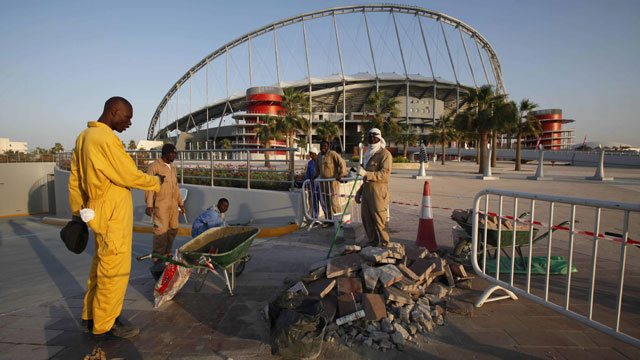Originally posted to The Guardian website, 26 March 2020
As the Gulf state outlaws ‘all forms of gatherings’, migrant workers continue to toil on construction sites
Migrant labourers building stadiums and infrastructure for the 2022 World Cup in Qatar are still being sent to work on crowded construction sites, despite a government order outlawing “all forms of gatherings” because of the coronavirus pandemic.
With less than 1,000 days to go until the tournament kicks off, workers said it was “business as usual” as construction continued at a relentless pace.
Buses packed full of labourers could be seen heading to work, while workers told the Guardian they continue to endure long shifts with only limited health checks in place.
As arguments continue in the UK over whether it is safe for construction workers to turn up to work, the health secretary, Matt Hancock, said on Tuesday that essential building work can continue as long as workers remain two metres apart.
Such a condition would be nearly impossible to meet in Qatar, where workers live in crowded labour camps, sharing dormitories, often with eight to 10 others, and are transported to work in company buses crammed with up to 60 people.
While Qatar is not yet in lockdown, and work in some sectors continues, low-wage migrant workers are particularly vulnerable, given how closely they interact with others in labour camps and on the job.
Workers say they have no choice but to show up, compelled both by their employers and the urgent need to earn money for their families back home.
“I worry a lot about getting the virus, but I need the money,” said one Kenyan construction worker, not employed on a World Cup project, who works 14-hour shifts. He said he wears gloves and a mask at work but it is not enough. “Only God is enough,” he added.
A Nepalese labourer building a car park said his blood pressure is checked before each shift. “I use a face mask, which I bought myself. Those who don’t have a mask cover their mouth with a piece of cloth,” he said.
Last week, the Qatari authorities announced a “ban on all forms of gatherings … including but not limited to the Corniche, public parks, beaches and social gatherings”, but despite an almost total shutdown of gyms, cinemas, shopping malls and banks, the ruling appears not to apply to construction workers and others in the private sector.
Notices on the government’s social media sites urging people to avoid public spaces and gatherings provoked an angry response, with one user writing: “How will construction workers maintain social distancing? … No one cares about our safety … Do you think we don’t want to live? Do you think we don’t want to see our families?”
Another wrote that he was on the site for nine hours a day, adding: “We are not robots. We are not immune to the virus.”
Migrant workers in Qatar, and across the Gulf, are not allowed to change jobs without their employer’s permission, a system some rights groups have described as a form of modern slavery. Legislation to end the practice was unveiled in October but has not yet come into force.
Most migrant workers pay large recruitment fees, some as high as £4,000, to secure jobs in Qatar. Many find their salaries are less than they were promised. Low pay and late pay are commonplace, but workers are reluctant to complain for fear they will lose their jobs.
“It is hard for employees in any context to refuse to go to work, but in systems like Qatar, where employers have extreme levels of control over workers, it would be particularly risky,” said James Lynch, a director at Fair/Square Research and Projects and an expert on migrant workers in Qatar. “New migration to Qatar has been halted as a result of the pandemic, so the impact of losing your job is now even worse than it would be anyway.”
The number of confirmed cases of coronavirus in Qatar has now topped 500, with the vast majority migrant workers. The figure is the third highest in the Gulf, after Iran and Saudi Arabia.
In a statement, the Qatar government’s communications office said the wellbeing of everyone in Qatar is of paramount concern. Testing for coronavirus is free for all and anyone who tests positive receives high-quality care at no cost, they said.
“The government is in close coordination with employers to ensure that their health and safety is maintained. This includes working with companies to raise awareness for workers around preventive actions, including hygiene, sterilisation and cleaning of sites and buses, as well as controlled entry and exit to workplaces,” the statement said.
The supreme committee, the body organising the World Cup, has been approached for comment.
Link to the original post : https://www.theguardian.com/global-development/2020/mar/26/despite-coronavirus-its-business-as-usual-for-world-cup-workers-in-qatar


